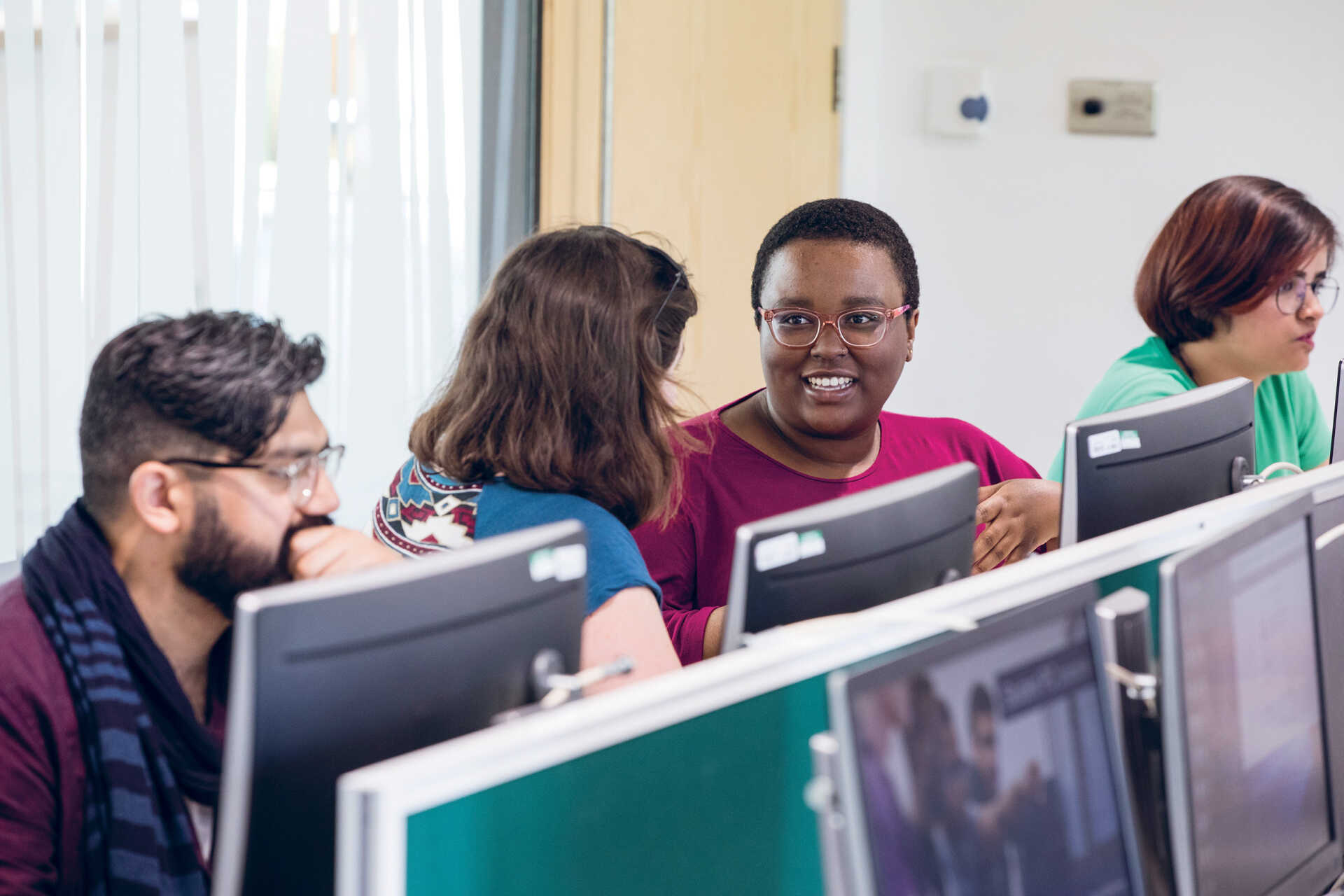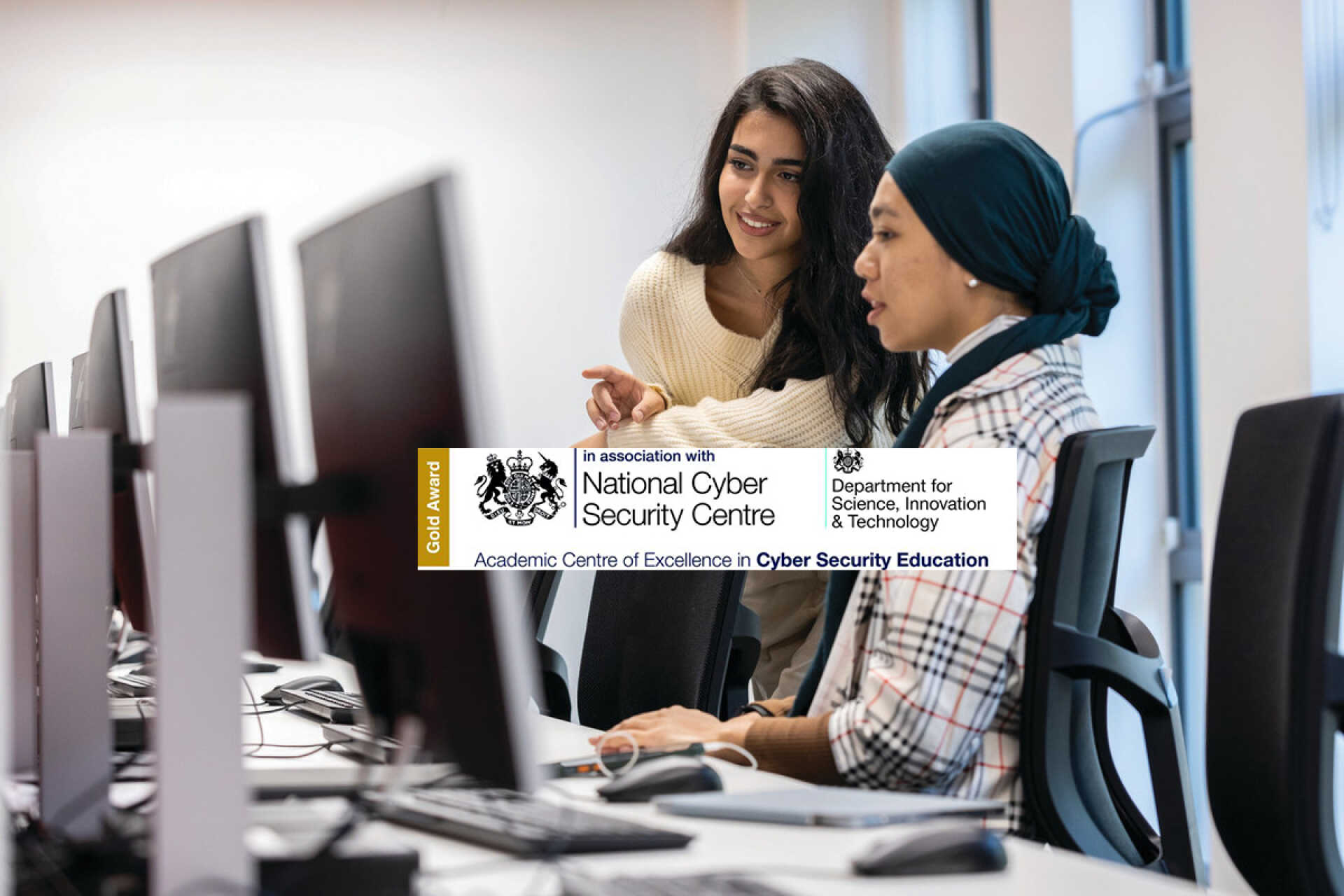Computer Science (Cyber Security)
If you're looking for a career in information security management or cyber security, Kent's got you covered.

If you're looking for a career in information security management or cyber security, Kent's got you covered.
Cyber security expertise is in demand across all industries as we look to protect our economies, health services and data. Be part of the future of cyber security.
The University has been recognised by the National Cyber Security Centre (NCSC) as an Academic Centre of Excellence in Cyber Security Education (ACE-CSE) with a Gold Award. This means that it has met the ACE-CSE standard for Gold Award, and makes Kent one out of only 12 ACEs-CSE in the UK to obtain Gold status.

Graduates have gone on to excel in well-paid careers at companies such as Cisco and IBM.
Learn to code in languages like Java and Python.

Amazing facilities, software packages and makerspaces on a vibrant campus with stunning city views.
We'll teach you the fundamentals of computer science and you'll choose from a range of modules with a focus in cyber security.

Take a paid placement year to help boost your professional skills and kick-start your career.
Our typical offer levels are listed below and include indicative contextual offers. If you hold alternative qualifications just get in touch and we'll be glad to discuss these with you.
BBB
Distinction, Distinction, Merit
120 tariff points from your IB Diploma, including Maths at 4 at HL or SL, typically H5, H6, H6 or equivalent
Mathematics grade 4/C
Pass the University of Kent International Foundation Programme.
The University will consider applicants holding T level qualifications in subjects closely aligned to the course.
Obtain the Access to HE Diploma with a minimum of 45 credits at Level 3, with 24 credits at Distinction and 21 credits at Merit.
The following modules are offered to our current students. This listing is based on the current curriculum and may change year to year in response to new curriculum developments and innovation:
You’ll learn the fundamentals of computer science with our range of compulsory modules.
This module provides an introduction to object-oriented software development. Software pervades many aspects of most professional fields and sciences, and an understanding of the development of software applications is useful as a basis for many disciplines. This module covers the development of simple software systems. Students will gain an understanding of the software development process, and learn to design and implement applications in a popular object-oriented programming language. Fundamentals of classes and objects are introduced and key features of class descriptions: constructors, methods and fields. Method implementation through assignment, selection control structures, iterative control structures and other statements is introduced. Collection objects are also covered and the availability of library classes as building blocks. Throughout the course, the quality of class design and the need for a professional approach to software development is emphasised and forms part of the assessment criteria.
Mathematical reasoning underpins many aspects of computer science and this module aims to provide the skills needed for other modules on the degree programme; we are not teaching mathematics for its own sake. Topics will include algebra, reasoning and proof, set theory, functions, statistics and computer arithmetic.
An introduction to databases and SQL, focussing on their use as a source for content for websites. Creating static content for websites using HTML(5) and controlling their appearance using CSS. Using PHP to integrate static and dynamic content for web sites. Securing dynamic websites. Using Javascript to improve interactivity and maintainability in web content.
This module follows from CO322 and aims to provide students with more understanding of the theory behind the formal underpinnings of computing. It will build upon the abstract reasoning skills introduced in CO322. Matrices, vectors, differential calculus, probability and logic will be introduced.
This module provides an introduction to human-computer interaction. Fundamental aspects of human physiology and psychology are introduced and key features of interaction and common interaction styles delineated. A variety of analysis and design methods are introduced (e.g. GOMS. heuristic evaluation, user-centred and contextual design techniques). Throughout the course, the quality of design and the need for a professional, integrated and user-centred approach to interface development is emphasised. Rapid and low-fidelity prototyping feature as one aspect of this.
This module equips students with an understanding of how modern cloud-based applications work. Topics covered may include: • A high-level view of cloud computing: the economies of scale, security issues, ethical concerns, the typical high-level architecture of a cloud-based application, types of available services (e.g., parallelization, data storage). • Cloud infrastructure: command line interface; containers and virtual machines; parallelization (e.g., MapReduce, distributed graph processing); data storage (e.g., distributed file systems, distributed databases, distributed shared in-memory data structures). • Cloud concepts: high-level races, transactions and sequential equivalence; classical distributed algorithms (e.g., election, global snapshot, consensus, distributed mutual exclusion); scheduling, fault-tolerance and reliability in the context of a particular parallelization technology (e.g., MapReduce). • Operating system support: network services (e.g., TCP/IP, routing, reliable communication), virtualization services (e.g., virtual memory, containers)
This module aims to strengthen the foundational programming-in-the-small abilities of students via a strong, practical, problem solving focus. Specific topics will include introductory algorithms, algorithm correctness, algorithm runtime, as well as big-O notation. Essential data structures and algorithmic programming skills will be covered, such as arrays, lists and trees, searching and sorting, recursion, and divide and conquer.
This module builds on the foundation of object-oriented design and implementation found in CO320 to provide both a broader and a deeper understanding of and facility with object-oriented program design and implementation. Reinforcement of foundational material is through its use in both understanding and working with a range of fundamental data structures and algorithms. More advanced features of object-orientation, such as interface inheritance, abstract classes, nested classes, functional abstractions and exceptions are covered. These allow an application-level view of design and implementation to be explored. Throughout the course, the quality of application design and the need for a professional approach to software development is emphasised.
Develop core concepts in areas such as AI and software development.
The curriculum covers topics in algorithms and data structures, such as hashing and graph algorithms. It addresses how to program such algorithms, as well as how to test them, reason about their correctness and analyse their efficiency. It includes a mathematical treatment of big-O notation.
This module covers the basic principles of machine learning and the kinds of problems that can be solved by such techniques. You learn about the philosophy of AI, how knowledge is represented and algorithms to search state spaces. The module also provides an introduction to both machine learning and biologically inspired computation.
This module provides an introduction to the theory and practice of database systems. It extends the study of information systems in Stage 1 by focusing on the design, implementation and use of database systems. Topics include database management systems architecture, data modelling and database design, query languages, recent developments and future prospects.
Building scaleable web sites using client-side and and server-side frameworks (e.g. JQuery, CodeIgniter). Data transfer technologies, e.g. XML and JSON. Building highly interactive web sites using e.g. AJAX. Web services. Deploying applications and services to the web: servers, infrastructure services, and traffic and performance analysis. Web and application development for mobile devices.
This module introduces students to the functional programming paradigm, using at least one modern functional programming language to put the core concepts into practice. The module will develop both the foundation and theory of this paradigm, as well as the practice and application of the paradigm to solve problems and build systems. The module will core topics, including:
• Functions as first-class language constructs and as a central organising principle;
• Higher-order functions and compositional programming;
• Basic semantics of functional languages;
• The role of types in programming;
• Algebraic data types and pattern matching;
• Recursion and recursive data types;
• Differences with imperative and object-oriented programming paradigms;
• Properties of programs, (e.g., purity, side-effect freedom, totality, and partiality).
• The lambda-calculus as a programming model and foundation.
• BNF grammars for representing context-free syntax, and its relation to ADTs and language manipulation.
• Testing and issues of building correct software.
The module will develop practical skills in programming and problem solving using functional programming. There will also be a chance to apply functional programming to help understand better concepts in logic and mathematics.
Later parts of the module will then consider concurrent programming in the context of functional programming, including concurrent programming models and primitives (e.g., message-passing concurrency), parallelism, synchronisation and communication, and properties of deadlock, communication-safety, and starvation.
This module aims to provide students with an understanding of the fundamental components (hardware and software) of a typical computer system, and how they collaborate to execute software programs. The module provides a compressive overview from the lowest level of abstractions in hardware to the highest level of abstractions of modern programming languages. For example, they will see logic circuits, machine language, programming language implementations, high-level languages, and applications. This material provides a general understanding of computers, and it will also prepare students to develop software considering the system perspective, e.g. cost of abstraction and performance implications
Cyber security has always been an important aspect of computing systems but its importance has increased greatly in recent years. The curriculum covers areas where cyber security is of major importance, but have different security requirements and may be exposed to different threats and attacks. It also covers techniques and mechanisms used to secure computer systems and data to meet those requirements and protect them. The areas looked at include computer operating systems (and increasingly, distributed operating systems), distributed applications (such as electronic commerce over the Internet), embedded systems (ranging from smart cards to large industrial plant and telecommunications systems), and users. The techniques and mechanisms looked at include cryptography, authentication & authorisation, and access control. Furthermore, the curriculum integrates the legal, ethical, and professional perspectives, for instance, to address concerns about data security, privacy, and societal impact of computing systems.
The module studies team-based Agile software development in detail and places it in a wider software development context.
Topics covered include
• Concepts, principles, practice and philosophy of an Agile approach to software development, contrasting with more structured approaches.
• Collaboration: programmer collaboration, team values, customer involvement, project management, standards and reporting.
• Planning: release and sprint planning, risk assessment, user stories and resource estimating
• Development practices: incremental requirements, test-driven development, refactoring, scrum, code review, quality assurance, continuous integration.
• Tools: IDEs, version control, automated code quality evaluation, issue tracking.
• Ethics, Intellectual property, codes of conduct and professional responsibility.
You’ll be able to choose from a range of modules with a focus in cyber security.
Propositional & Predicate Logic, including proofs. Formal languages: finite automata, regular expressions, CFGs. Turing machines, decidability.
The module starts with a comprehensive and detailed study of current computer networks and communications technologies. It includes: a review of network techniques, switching and multiple access; high speed local area networks; network protocols, including data link, network, transport and application layers. A selection of key topics are looked at in greater depth to reveal the state-of-the-art and issues (problems) that remain to be solved.
More information to follow.
More information to follow.
More information to follow.
This module is designed to provide students across the university with access to knowledge, skill development and training in the field of entrepreneurship with a special emphasis on developing a business plan in order to exploit identified opportunities. Hence, the module will be of value for students who aspire to establishing their own business and/or introducing innovation through new product, service, process, project or business development in an established organisation. The module complements students' final year projects in Computing, Law, Biosciences, Electronics, Multimedia, and Drama etc.
Learn what is meant by machine learning and how to explain the key algorithms (especially the backpropagation algorithm for learning deep neural networks) and mathematical equations that underlie them. You'll familiarise yourself with a range of machine learning algorithms and their inner mechanisms. Using state-of-the-art software technology you'll apply these algorithms to the solution of problems. You will study the existing machine learning implementations of selected algorithms, and you will also engage in implementation of algorithms and procedures relevant to machine learning.
There is an increasing use of nature-inspired computational techniques in computer science. These include the use of biology as a source of inspiration for solving computational problems, such as developments in evolutionary algorithms and swarm intelligence. It is therefore proposed to allow students the opportunity to become exposed to these types of methods for use in their late careers.
"Indicative topics include:
• Resource Description Framework (RDF) & RDF Schema:
• Information representation and knowledge exchange on the web
o Applications of RDF
• RDF Query and Inference Languages (e.g. SPARQL etc.)
• Web Ontology Language (OWL):
o Publishing and sharing of ontologies
• Knowledge management
Students will spend one half-day per week for ten weeks in a school with a nominated teacher. They will observe sessions taught by their designated teacher and possibly other teachers. Later they will act somewhat in the role of a teaching assistant, by helping individual pupils who are having difficulties or by working with small groups. They may take 'hotspots': brief sessions with the whole class where they explain a technical topic or talk about aspects of university life. They must keep a weekly log of their activities. Each student must also devise a special project in consultation with the teacher and with the module convener. They must then implement and evaluate the project.
The following is indicative of topics/themes this module will include:
• An overview of basic concepts related to Computational Intelligence (CI) techniques, such as heuristic search and optimisation
• Presentation of different CI algorithms, such as hill climbing, simulated annealing, genetic algorithms and genetic programming
• An overview of basic concepts related to real-world problems related to business, economics and finance, such as financial forecasting, automated bargaining, portfolio
optimisation, and timetabling
• The use of Computational Intelligence techniques to solve real-world problems
• Computational Intelligence decision support systems and software wind tunnels for testing new markets and strategies.
The module will cover a mixture of theoretical and practical topics in the area of the Internet of Things (IoT), that is, the use of Internet technologies to access and interact with objects in the physical world. This will include coverage of the range of sensor and actuator devices available, ways in which they communicate and compute, methods for getting information to and from IoT-enabled devices, and ways of visualising and processing data gained from the IoT. A practical component will consist of building the hardware and software for a sensor network and a system to collect, process and visualise data from that network.
A study of techniques for interpreting and compiling programming languages, implementing them in a typed functional programming language (e.g., OCaml, Haskell). The module will outline a whole compiler from source to machine code, but will focus in depth on key algorithms and techniques. Possible in-depth topics include:
• writing interpreters,
• Hindley-Milner type inference,
• register allocation,
• garbage collection,
• abstract interpretation,
• static single assignment form.
The implemented language will be based on a simple imperative (e.g., Pascal-like) language with some extensions to address advanced topics in data layout (e.g., closures, objects, pattern matching). The course will be organized around a simple, but complete, example compiler that the student will have to understand and modify.
The module aim is to give students an overview and understanding of key theoretical, practical and philosophical research and issues around computational creativity, and to give them practical experience in writing and evaluating creative software.
The following is an indicative list of topics that may be covered:
• Introduction to computational creativity
• Examples of computational creativity software e.g. musical systems, artistic systems, linguistic systems, proof generator systems, systems for 2D and 3D design.
• Evaluation of computational creativity systems (both of the quality and the creativity of systems)
• Philosophical issues concerning creativity in computers
• Comparison of computer creativity to human creativity
• Collaborative creativity between humans and computers
• Overview of recent research directions/results in computational creativity
• Practical experience in writing creative software.
This module is aimed at introducing the principles of concurrency theory (1, 2, 3) and demonstrating how these can be applied to design and implement distributed applications (4). Advanced concepts of Web services will be studied and placed in the perspective of these principles (5, 6).
The following is an indicative list of topics:
• Message passing primitives for concurrency: synchronous versus asynchronous message passing, the actor model.
• Reasoning on processes: temporal logic, safety and liveness properties, bisimulation.
• Channel passing and mobility.
• Design and implementation of application–level protocols.
• Web services: from stateless services to distributed business processes (also known as service orchestrations).
• Transaction protocols on the Web: two-phase commit, long running transactions.
This module will provide the student with an understanding of basic principles of signals; introduce digitisation methods such as sampling, quantisation and coding; describe and apply signal analysis techniques, such as segmentation, noise reduction, filtering, spectral analysis, feature extraction and classification (including recognition and decision making) to solve practical signal analysis problems using Matlab.
An overview of basic concepts related to eHealth and a perspective on current HIT (Health Information Technology) and innovation. Review of current healthcare related IT systems. The use of information technology for handling clinical data, health systems. Data representation and knowledge management. Security and privacy. Ethics and legal requirements of eHealth systems. Clinical decision support systems. TeleHealth tools for remote diagnosis, monitoring, and disease management. Delivery and monitoring platforms for both hospitals and home environment. Innovation in eHealth systems leading to start-up companies.
This module will give students an overarching introduction to quantum information processing (QIP). At the end of the course the students will have a basic understanding of quantum computation, quantum communication, and quantum cryptography; as well as the implications to other fields such as computation, physics, and cybersecurity.
We will take a multi-disciplinary approach that will encourage and require students to engage in topics outside of their core discipline. The module will cover the most essential mathematical background required to understand QIP. This includes: linear algebra, basic elements of quantum theory (quantum states, evolution of closed quantum systems, Born's rule), and basic theory of computing. The module will introduce students to the following theoretical topics: quantum algorithms, quantum cryptography, quantum communication & information. The module will also address experimental quantum computation & cryptography.
This module explores a range of different data mining and knowledge discovery techniques and algorithms. You learn about the strengths and weaknesses of different techniques and how to choose the most appropriate for any particular task. You use a data mining tool, and learn to evaluate the quality of discovered knowledge.
This module is concerned with a range of topics in video game design and development, including game physics, AI, level design, player behaviour, game rules and mechanics, as well as user interfaces. This module introduces students to game development using industry-standard software tools.
The module introduces fundamental techniques employed in image processing and pattern recognition providing an understanding of how practical pattern recognition systems may be developed able to address the inherent difficulties present in real world situations. The material is augmented with a study of biometric and security applications looking at the specific techniques employed to recognise biometric samples.
This module introduces the theory and practice of employing computers as the control and organisational centre of an electronic or mechanical system, and examines issues related to time critical systems. It also provides exposure to practical embedded systems design through practical work, with one assignment exploring the ideas of real-time operating systems introduced in the lectures and a second using a microcomputer programmed in 'C' to control the ignition timing of a simulated petrol engine.
Within the School of Computing are authors of widely used textbooks, a National Teaching Fellow and Association of Computer Machinery (ACM) Award-winning scientists. Programmes are taught by leading researchers who are experts in their fields.
Teaching is based on lectures, with practical classes and seminars, but we are also introducing more innovative ways of teaching, such as virtual learning environments and work-based tuition. Work includes group projects, case studies and computer simulations, with a large-scale project of your own choice in the final year.
Each stage comprises eight modules. Most modules run for a single 12-week term. Each module has two lectures and one to two hours of classes, making approximately 14 formal contact hours per week and eight hours of 'homework club' drop-in sessions each term.
We provide excellent support for you throughout your time at Kent. This includes access to web-based information systems, podcasts and web forums for students who can benefit from extra help. We use innovative teaching methodologies, including BlueJ and LEGO© Mindstorms for teaching Java programming.
Our staff have written internationally acclaimed textbooks for learning programming, which have been translated into eight languages and are used worldwide. A member of staff has received the SIGCSE Award for Outstanding Contribution to Computer Science Education. The award is made by ACM, the world's largest educational and scientific computing society.
Assessment is by a combination of coursework and end-of-year examination and details are shown in the module outlines on the web. Project modules are assessed wholly by coursework.
The marks from stage one do not go towards your final degree grade, but you must pass to continue to stage two.
Most stage two modules are assessed by coursework and end-of-year examination. Marks from stage two count towards your degree result.
Most stage three modules are assessed by a combination of coursework and end-of-year examination. Projects are assessed by your contribution to the final project, the final report, and oral presentation and viva examination. Marks from stage three count towards your degree result.
In stage three your project counts for 25% of the year's marks.
For a student studying full time, each academic year of the programme will comprise 1200 learning hours which include both direct contact hours and private study hours. The precise breakdown of hours will be subject dependent and will vary according to modules.
Methods of assessment will vary according to subject specialism and individual modules.
Please refer to the individual module details under Course Structure.
For programme aims and learning outcomes please see the programme specification.

You'll be on course for a big future. Our graduates have gone on to work in:
Recent graduates have gone on to develop successful careers at leading companies such as:


The 2024/25 annual tuition fees for this course are:
For details of when and how to pay fees and charges, please see our Student Finance Guide.
For students continuing on this programme, fees will increase year on year by no more than RPI + 3% in each academic year of study except where regulated.*
The University will assess your fee status as part of the application process. If you are uncertain about your fee status you may wish to seek advice from UKCISA before applying.
Find out more about accommodation and living costs, plus general additional costs that you may pay when studying at Kent.
Kent offers generous financial support schemes to assist eligible undergraduate students during their studies. See our funding page for more details.

We have a range of subject-specific awards and scholarships for academic, sporting and musical achievement.
The only chance of me pursuing my career of choice was to find a great University that offered an industrial placement year.

We welcome applications from students all around the world with a wide range of international qualifications.

Student Life

Kent ranked top 50 in the The Complete University Guide 2023 and The Times Good University Guide 2023.
Kent Sport
Kent has risen 11 places in THE’s REF 2021 ranking, confirming us as a leading research university.

An unmissable part of your student experience.